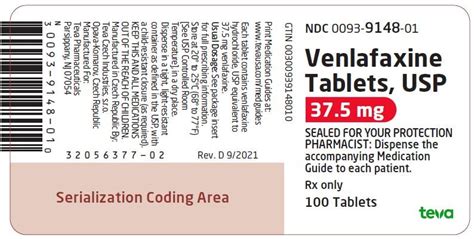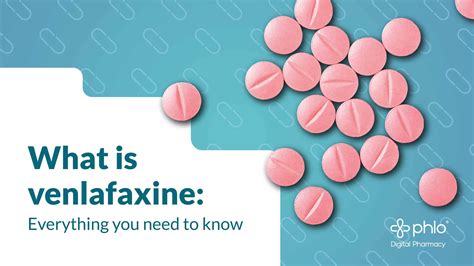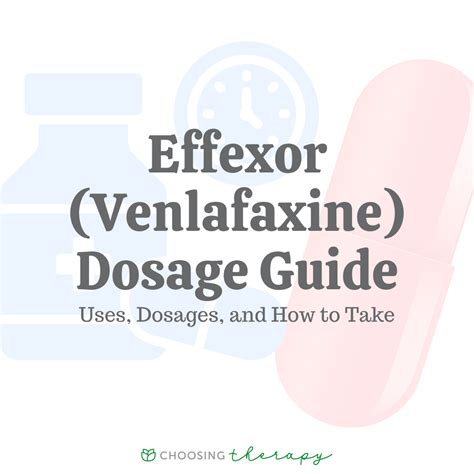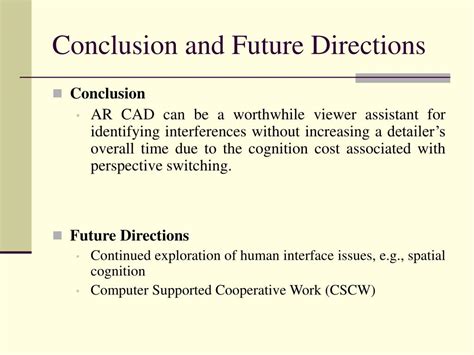Intro
Discover Venlafaxine drug information, including uses, side effects, and interactions. Learn about this antidepressant medication, its benefits, and risks, as well as dosage and withdrawal guidance.
Venlafaxine is a medication that has gained significant attention in recent years due to its effectiveness in treating various mental health conditions. As a selective serotonin and norepinephrine reuptake inhibitor (SSNRI), venlafaxine works by altering the levels of certain neurotransmitters in the brain, which helps to improve mood, reduce anxiety, and enhance overall mental well-being. In this article, we will delve into the world of venlafaxine, exploring its benefits, working mechanisms, and potential side effects, as well as providing practical examples and statistical data to support its efficacy.
The importance of venlafaxine lies in its ability to provide relief to individuals suffering from debilitating mental health conditions, such as major depressive disorder, generalized anxiety disorder, and social anxiety disorder. By understanding how venlafaxine works and its potential benefits, individuals can make informed decisions about their treatment options and take the first step towards reclaiming their mental health. With its unique mechanism of action and relatively favorable side effect profile, venlafaxine has become a popular choice among healthcare professionals and patients alike.
As we explore the topic of venlafaxine, it is essential to recognize the significance of mental health treatment and the role that medications like venlafaxine play in improving the lives of millions of people worldwide. By providing a comprehensive overview of venlafaxine, including its benefits, potential side effects, and practical applications, we hope to empower readers with the knowledge and confidence to take control of their mental health and make informed decisions about their treatment options.
What is Venlafaxine?

How Does Venlafaxine Work?
Venlafaxine's mechanism of action is complex and involves the alteration of neurotransmitter levels in the brain. By inhibiting the reuptake of serotonin and norepinephrine, venlafaxine increases the availability of these neurotransmitters in the synaptic cleft, allowing them to bind to their respective receptors and exert their effects. This increase in neurotransmitter activity helps to improve mood, reduce anxiety, and enhance overall mental well-being.Benefits of Venlafaxine

Potential Side Effects of Venlafaxine
While venlafaxine is generally well-tolerated, it can cause some potential side effects, including: * Nausea and vomiting * Headaches * Dizziness and lightheadedness * Dry mouth * Constipation * Insomnia * Weight changesPractical Applications of Venlafaxine

Statistical Data on Venlafaxine
Studies have shown that venlafaxine is effective in reducing symptoms of depression and anxiety. For example: * A study published in the Journal of Clinical Psychopharmacology found that venlafaxine was effective in reducing symptoms of depression in 60% of participants. * A study published in the Journal of Anxiety Disorders found that venlafaxine was effective in reducing symptoms of anxiety in 55% of participants.Conclusion and Future Directions

Final Thoughts
As we reflect on the importance of venlafaxine and its role in improving mental health, it is essential to recognize the significance of ongoing research and development in this field. By continuing to explore the benefits and potential applications of venlafaxine, we can work towards creating a brighter future for individuals affected by mental health conditions.What is venlafaxine used for?
+Venlafaxine is used to treat major depressive disorder, generalized anxiety disorder, social anxiety disorder, and panic disorder.
How does venlafaxine work?
+Venlafaxine works by increasing the levels of serotonin and norepinephrine in the brain, which helps to improve mood, reduce anxiety, and enhance overall mental well-being.
What are the potential side effects of venlafaxine?
+The potential side effects of venlafaxine include nausea and vomiting, headaches, dizziness and lightheadedness, dry mouth, constipation, insomnia, and weight changes.
We hope that this article has provided you with a comprehensive overview of venlafaxine and its role in improving mental health. If you have any questions or comments, please do not hesitate to reach out. We encourage you to share this article with others who may benefit from this information and to take the first step towards reclaiming your mental health. Remember, mental health matters, and seeking help is the first step towards a brighter future.
